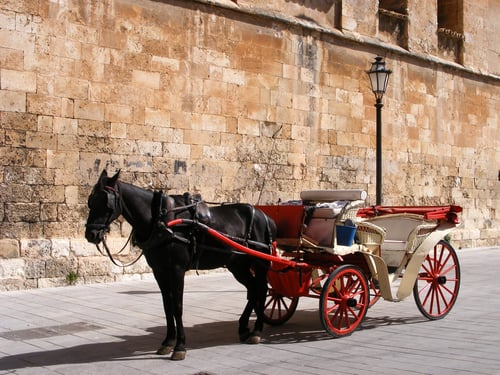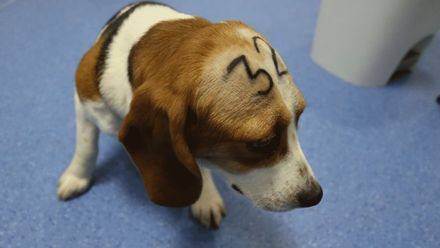When Palma city hall introduced a measure during the heatwave this summer to stop horse-drawn carriages during the hottest part of the day – between 12 noon and 5pm on days when heat alerts were in place – it caused fury amongst carriage drivers who said their livelihoods were threatened.
It was, they argued, a long tradition and they followed regulations imposed by the town council to ensure the horses were well cared for.

A recent protest by locals in Palma. Photo: Asociacion Animalista ICA.
Despite calls by local animal rights groups and pledges by councillors to tighten animals rights legislation concerning the horse-drawn rides, a carriage ride is still a popular activity among tourists.
But Elisa Allen, who recently visited the island, argues that it's time to put a stop to it. Here she explains why:
Two years ago, a horse used in Mallorca's carriage industry was killed when he suddenly bolted and crashed into a wall, panic-stricken, after being startled by a tourist who wanted to pet him. This accident not only cost the horse his life but also put bystanders at risk of serious injury.
Yet, it's far from an isolated incident. Wherever there are carriage rides, there will be accidents – and lives will be endangered. Horses startle easily and are extremely sensitive to loud and unexpected noises, and busy city streets have plenty of both, which often leads to accidents. The honk of a car horn – or even just an insect bite – can be enough to trigger a horse to bolt.
In New York City, a frightened horse collided with some parked cars and flipped his carriage over onto himself, becoming pinned under the wreckage. He survived but was led off limping and bleeding from a leg wound. In July 2011, in New York City, three tourists and a carriage driver were hurt when a taxi rear-ended a horse-drawn carriage near Central Park. One passenger was thrown to the pavement, and the driver sustained a serious head injury. The horse was knocked to the ground, and the carriage fell on top of him. In Rome, a 17-year-old horse named Birillo fell and broke his leg on a cobbled street after being hit by a lorry. He writhed in agony for four hours before a veterinarian finally arrived to euthanise him. Another horse died after being struck by a car.
But, despite such incidents and the danger of more to come, exhausted horses in Mallorca are still being forced to pull carriages through the island's busy tourist spots of Palma, Alcúdia, and Sant Llorenç des Cardassar even in the summer months, when temperatures regularly reach 40 degrees, causing many to collapse from heat exhaustion. In addition, pounding the pavement day in and day out takes a considerable toll on horses' legs, hooves, backs, and lungs, and they commonly suffer from respiratory ailments as a result of breathing in exhaust fumes.
In response to similar horse-drawn carriage accidents, many cities, including Barcelona, Beijing, Las Vegas, London, Paris, Tel Aviv, and Toronto, have banned carriage rides, making the simple and ethical choice to retire their beleaguered horses and relegate the carriages to the dustbin of history, where they belong. Mallorca's cities must follow suit. They could replace the use of horses with modern, eco-friendly, electric-powered antique cars, which would retain the nostalgic flair but eliminate the cruelty to horses.
PETA have launched a petition asking authorities in Mallorca to ban horse-drawn carriage rides.
Elisa Allen is the director of animal rights campaigning group PETA UK
READ MORE: Spain urged to stop 'torture' of unwanted greyhounds




 Please whitelist us to continue reading.
Please whitelist us to continue reading.